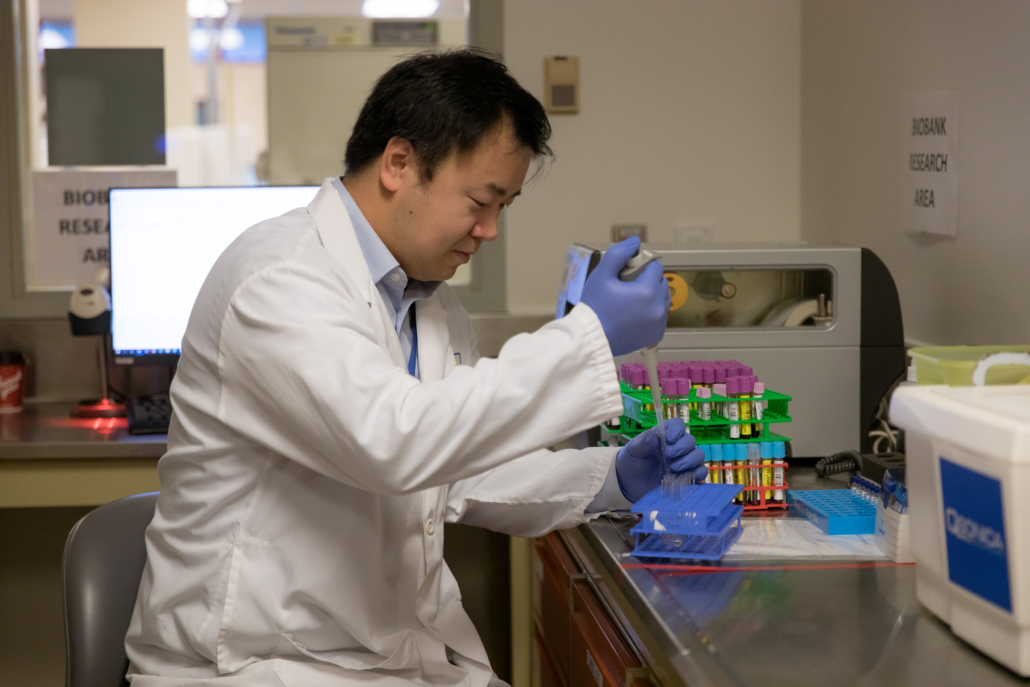Research project: Detecting respiratory pathogens in pneumonia patients to accelerate treatment and reduce costs
Dr. Chen and Dr. Goodlett aim to develop a quick and affordable technique to identify respiratory pathogens (bacteria and fungi) in pneumonia patients. Currently, identifying pathogens can take a few days, and this project seeks to create a test that produces results in one hour. Rapid results can accelerate treatment and reduce costs, and could have an immense impact on survival and management for patients with sepsis (the body’s extreme and potentially life-threatening response to infection). ($93,000)

VHF: Tell us about your research project.
Dr. Chen: I’m interested in advancing clinical diagnostics, which means making diagnosis faster, easier, more affordable, and better quality. Currently, diagnosing a patient with pneumonia—especially a very sick patient who is intubated—requires a procedure to “wash” their lung and then culture the fluid that comes off of the lung. The culture is very time-consuming, and it can take 72 hours to get a result. This isn’t ideal because 72 hours is a long time to wait to start the right therapy for that patient, and it can sometimes result in negative health outcomes.
Through this research project, our goal is to identify the bacteria or other pathogens directly from the lung wash fluid and bypass that lengthy culture step completely. We could then identify the pathogens within an hour of receiving the fluid in the lab, so the patient could start receiving the appropriate treatment the same day, rather than three days later. Ultimately, this will improve care, and it helps both the clinicians and the patients.
VHF: What do you think is the most innovative part of your project?
Dr. Chen: Globally, no one is doing what’s called “direct-from-specimen” analysis, which means you don’t have to culture it to grow and amplify the number of pathogens. Globally, everyone follows routine clinical care, which is to culture the specimen for up to 72 hours, find out what pathogens are growing, and then determine the treatment from there. So, the innovative part of our project is the rapid diagnosis—and it’s also more affordable for our healthcare system, and better quality. This is immediately relevant for the Vancouver Island population. From there, we can offer it provincially, and grow organically from there.
VHF: What does this research mean for a future patient with pneumonia?
Dr. Chen: In principle, whenever you have early diagnosis and treatment, patients are able to receive to the right treatment in less time. We call this precision medicine, and it’s about treating the patient individually rather than the entire population. If you and I are both sick with pneumonia and we don’t know what pathogen is causing it, we get the same treatment—maybe the same antibiotic. But the faster we know what bacteria is causing you and I to be sick—because it could be a different bacteria for each of us—the sooner the right antibiotics can be given. This decreases the chance of disease progression, and can be lifesaving for a patient in the ICU who has chronic or complex infections.
VHF: Why did you choose Vancouver Island to be the community you contribute to?
Dr. Chen: I trained at McGill University, and I did a fellowship here. I stayed for four months while I was doing my research, and I just fell in love with the place. Who doesn’t? I have two little kids, and it’s a great place to raise a family. Island Health has been very supportive in providing the space and some of the infrastructure for my research. Overall, I think this is the right place for my career, and for my family too. I have to say that I was interviewed at Vancouver, but I chose Victoria, and I say that proudly.
VHF: What’s your “why?” What drives your work?
Dr. Chen: I am a clinical pathologist, so my daily work is trying to provide the right diagnosis to clinicians and patients. But I am always looking for areas of improvement. We can always do better, and I see this every day in my work. I ask questions like, “Why does this take so long? Can it be faster?” or “Why is this so expensive and inaccessible to the patient?” You really need to gather and develop that expertise to translate it into a better outcome for the patient. All of my work centers around what can immediately impact healthcare and the patients.
VHF: How do gifts from our Foundation’s community help fund innovation on Vancouver Island?
Dr. Chen: I think we are in a unique position on the Island. There are a lot of very dedicated and knowledgeable people here who are keen to find ways to improve healthcare. We also have support from Island Health, academic institutions, and foundations like VHF who want to help us. You know, I didn’t reach out the Victoria Hospitals Foundation—I was introduced to the Foundation because they wanted to support us. This has set me up for success.
VHF: What does the word “innovation” mean to you?
Dr. Chen: It’s something that requires you to think outside of the box and challenge the status quo. It’s also about not being afraid to look for the answers that are out there.
VHF: What gives you hope for the future?
Dr. Chen: I’m very optimistic, partly because I have very good support and good collaborators both on the Island and in the province. I have wonderful students from the University of Victoria who are well-trained and very keen to learn new things. But I think most importantly, the relationships I have with scientists, the hospital system, the patients, and the Foundation continue to grow. So, I think the future is very bright. With the right support, we can tackle anything. And it’s continuous support from donors that allows us to carry on.




